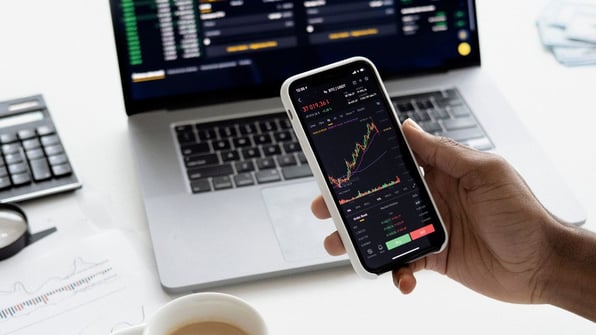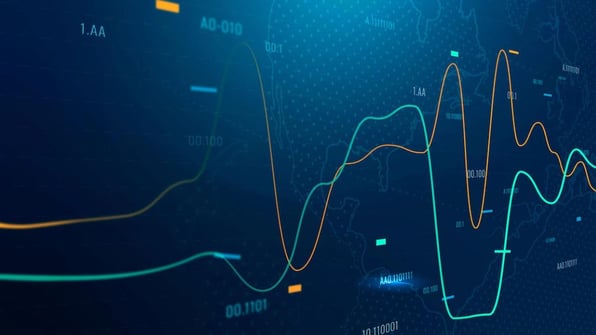Currently, trading in Forex and CFDs is one of the easiest accessible investment solutions. Forex is the most liquid market in the world. This feature attracts many investors. However, another reason that drives more and more investors to trade Forex is that it allows you to learn and get results relatively quickly and with much smaller capital requirements.
Although it may seem very complicated, we will explain what factors to take into consideration before starting. In addition, we will also provide you with the right tool to start investing in this market: RIZEAPP.
Find out how to start trading Forex, commodities or the major indices, and all the steps to follow here!
What is Forex trading?
If you travel to Canada, the United States or Turkey from somewhere else in the world, you have to exchange your pounds for the currency of that country. Otherwise, you cannot make any purchases.
This currency exchange operation is called Forex or more commonly Foreign Exchange.
FOREX stands for Foreign Exchange, also known as the foreign exchange market because it is the market where currencies from all over the world are traded. If you are wondering more specifically what the Forex market is, the answer is that it is the world's largest financial market: more than 5 trillion dollars are traded daily on this market. This amount is larger than the sum of all the world's stock exchanges.
Today, trading on the Forex market takes place on the so-called interbank market, which operates 24 hours a day, 5 days a week. Forex operates thanks to a global interbank network, spread over four main financial centres covering all global time zones (London, New York, Sydney and Tokyo).
Originally, Forex was only accessible to investment funds, banks or large corporations. Today, however, thanks to the possibilities of online trading, everyone can invest in the foreign exchange market.
Learning Forex from scratch: How to read an exchange rate on Forex?
There is some specific terminology in Forex that is important for you to know:
- Pairs: Forex trading units are called pairs and they show the fluntuation between two currencies.
|
Symbol pairs |
Description |
Exchange rate |
|
EUR/USD |
EUR – US Dollar |
1.0556 |
- Pips: Pip is the unit used in forex trading to count price movements.
- Bid: The name of the selling price of a currency.
- Ask: The name of the price at which a currency is bought.
- Spread: The difference between the bid and ask price. Here is a table to help you start getting familiar with what you will encounter:
|
Symbol |
Bid |
Ask |
Spread |
|
EUR USD |
1.05558 |
1.05557 |
0.1 |
|
GBP USD |
1.19931 |
1.19938 |
0.5 |
|
USD CAD |
1.35352 |
1.35354 |
0.2 |
|
USD JPY |
133.725 |
133.734 |
0.9 |
*The above prices are only for indicative purposes
- Lot: Used to designate the standard number of units an asset is traded in. In Forex, a standard lot is 100,000 units. Therefore, if, for example, you issue an order to buy one lot of EUR/USD, you would be buying 100,000 euros.
- Leverage: Not all investors have a large amount of capital available to open larga FOREX positions. To solve this, one of the most common alternatives is leverage in Forex, which allows the trader to open a position with less money than the position represents.
As a type of credit provided by the broker to traders, leverage allows you to multiply the value of the position and deposit a much smaller amount of capital as collateral.
How does Forex work?
Before starting to trade, the trader must have a good understanding of the basics, such as what the Forex market is and what Forex trading is.
In Forex, currencies are the main exchangeable asset. Therefore, you trade the exchange rate between currency pairs. FX trading consists of buying or selling currency pairs. This operation involves selling one currency and buying another.
To better understand what a currency pair is, let's take one of the most popular currency pairs, the Eurodollar, represented as follows: EUR/USD. The currency on the left is known as the primary or base currency, while the currency on the right is the secondary or quote currency. In this case, the euro (EUR) is bought or sold for a certain amount of dollars (USD). If, for example, the EUR/USD exchange rate were 1.20, this means that 1 euro (EUR) is exchanged for 1.20 dollars (USD). Let's see how this principle is applied in Forex trading:
- If a trader believes that he euro will increase in value against the dollar, he will buy the EUR/USD pair, or go "Long" the EUR/USD. By issuing this order, he is buying euros and selling dollars: buying the currency he believes to be stronger and selling the currency he considers to be weaker.
To close the trade, you will issue a sell order, which involves selling the euros and buying the dollars.
If the euro has appreciated against the dollar, the EUR/USD pair will have increased in value, so the trade will be profitable.
- If, on the other hand, the trader thinks that the US dollar is going to appreciate against the euro, he will sell the EUR/USD, or "short" the EURUSD. This order involves selling euros and buying dollars.
To close the trade, a buy order must be placed. If at the time of purchase the dollar has appreciated against the euro, the EUR/USD will have decreased in value, which will grant a profit on the trade.
There are a multitude of combinations of currency pairs that can be traded on Forex. However, to get started in Forex it is advisable to trade the most popular currencies as the information concerning their volatility is easily accessible from various sources.
How to choose a broker
Choosing a broker when you are new to trading can be overwhelming, with countless options available. You need to consider some essential criteria:
- Regulated broker: this guarantees the safety of your funds. Rizeapp’s services are provided by financial entities licensed and regulated in the EU and the UK by all the relevant financial authorities in each jurisdiction. In addition, if you are a EU citizen, your funds are kept in a segregated account, and protected by the ICF up to €20,000.
- Low spreads and platform speed. Rizeapp offers tight spreads, 0 commissions, no hidden fees, and negative balance protection.
- Wide range of tradable assets, so beginner traders can choose where to start. With Rizeapp you can invest in the major markets and Forex, with more than 60 pairs available around the clock 24/5.
- Fast customer support. Rizeapp offers 24/5 customer support, i.e. every day and around the clock.
As you can see, Rizeapp meets all the essential criteria that a trading platform should have. Not only that, but it also offers many other benefits that can help you improve your money management.
Usually,
Frequently asked questions
What is the minimun investment in forex?
Usually there is no minimum investment in forex and you can start trading from just €1. Some brokers even offer demo accounts, but you won't be able to make money in forex without investing some of your own money, as these are based on fictitious funds. Start with lower amounts (in most brokers you can start with 50€, and in Rizeapp with just 10€) and work your way up.
When is it best to trade Forex?
The currency markets are open almost constantly. Trades will cross, open and close at different times of the day throughout the week. It can be confusing trying to figure out when it is best to trade forex and which markets will be open or most volatile in your time zone. It is widely believed that the overlapping time in London and New York forex trading hours is the best time to get information on the direction and volatility of currencies.
What are the best indicators for Forex beginners?
When you are learning to trade Forex, it is preferable to use a few indicators, so that you can read the charts more easily. Many beginners choose moving averages to start with, but here is a list of the most commonly used trading indicators:
- MACD.
- Bollinger Bands.
- Stochastic.
- Ichimoku Kinko Hyo.
- Average True Range.
- Parabolic SAR.
- Pivot Points.
Note: The content of this article is for general information purposes only and does not constitute financial advice. If you have any questions about your personal circumstances, we recommend that you seek professional and independent advice. All financial instruments involve an element of risk.




